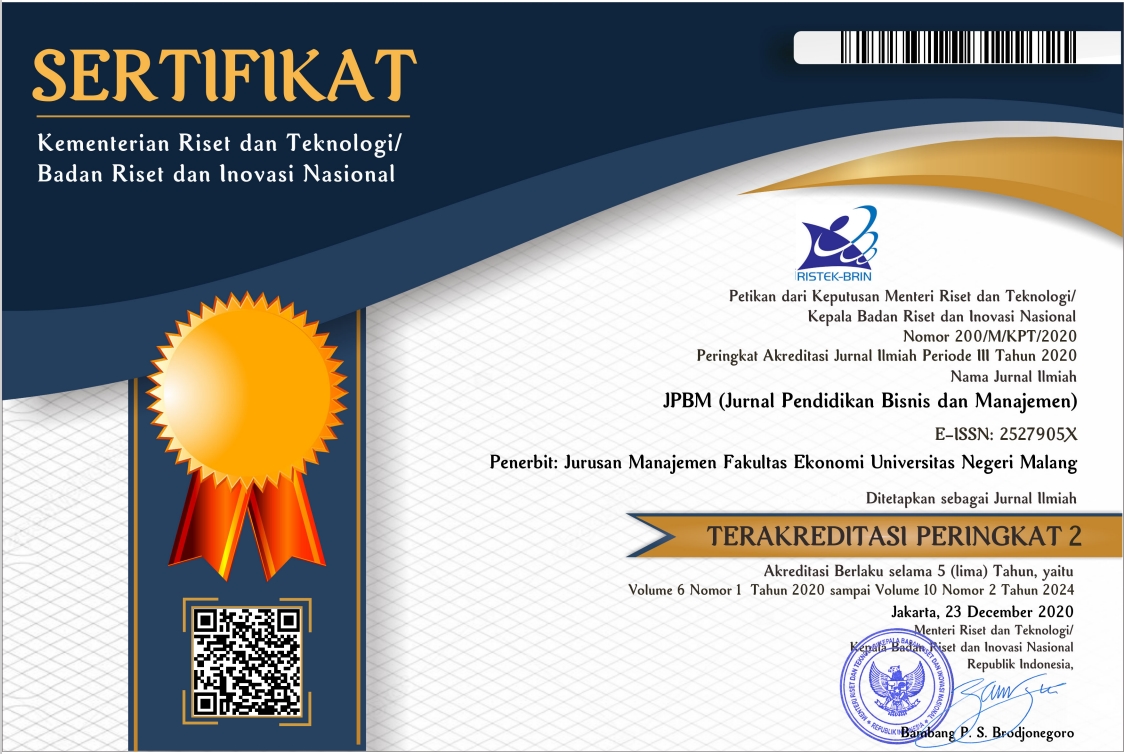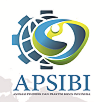Problem-Posing Learning Method for Enhancing the Competence of Digital Marketing Students
Abstract
Adopting a new lecture style will enable students to have meaningful learning and actively interact and solve problems. This study attempts to discover the online marketing professional ethics learning process through the problem-posing method. In doing so, this research involved classroom action research, which is provided through four stages: planning, implementation, observation, and reflection. Through the problem-posing method, lecturers can find solutions to problem-solving for the low scores of these students. Based on the implementation of classroom action research in the first and second cycles, it can be seen that the students’ scores are satisfying, which is indicated by the increase in student scores from pre-test to post-test. This implies that the problem-posing method has successfully enhanced students’ competence in the marketing profession ethics course. Meanwhile, based on the non-test observation sheet, it shows that the students’ response to the implementation of the marketing professional ethics course using the problem-posing method in the first and second cycles is good, but there need to be improvements to obtain a better assessment in the future.
Keywords: Problem posing method, learning methods, classroom action research.
Full Text:
PDFReferences
Akben, N. (2020). Effects of the problem-posing approach on students’ problem solving skills and metacognitive awareness in science education. Research in Science Education, 50(3), 1143-1165.
Aliyyah, R. R., Rachmadtullah, R., Samsudin, A., Syaodih, E., Nurtanto, M., & Tambunan, A. R. S. (2020). The perceptions of primary school teachers of online learning during the COVID-19 pandemic period: A case study in Indonesia. Journal of Ethnic and Cultural Studies, 7(2), 90-109.
Al-Samarraie, H., Shamsuddin, A., & Alzahrani, A. I. (2020). A flipped classroom model in higher education: a review of the evidence across disciplines. Educational Technology Research and Development, 68(3), 1017-1051.
Asih, N. F., & Ellianawati, E. (2019). The Enhancement of Verbal Communication Skills for Vocational Students through Project-Based Learning Physics. Jurnal Penelitian & Pengembangan Pendidikan Fisika, 5(1), 21-28.
Bradberry, L. A., & De-Maio, J. (2019). Learning by doing: The long-term impact of experiential learning programs on student success. Journal of Political Science Education, 15(1), 94-111.
Buil-Fabrega, M., Martínez Casanovas, M., Ruiz-Munzón, N., & Filho, W. L. (2019). Flipped classroom as an active learning methodology in sustainable development curricula. Sustainability, 11(17), 4577.
Cai, J., & Hwang, S. (2020). Learning to teach through mathematical problem posing: Theoretical considerations, methodology, and directions for future research. International Journal of Educational Research, 102, 101391.
Cai, J., Chen, T., Li, X., Xu, R., Zhang, S., Hu, Y., ... & Song, N. (2020). Exploring the impact of a problem-posing workshop on elementary school mathematics teachers’ conceptions on problem posing and lesson design. International Journal of Educational Research, 102, 101404.
Churiyah, M., Sholikhan, S., Filianti, F., & Sakdiyyah, D. A. (2020). Indonesia education readiness conducting distance learning in Covid-19 pandemic situation. International Journal of Multicultural and Multireligious Understanding, 7(6), 491-507.
Delcker, J., & Ifenthaler, D. (2021). Teachers’ perspective on school development at German vocational schools during the Covid-19 pandemic. Technology, Pedagogy and Education, 30(1), 125-139.
Fahyuni, E. F., Arifin, M. B. U. B., & Nastiti, D. (2019). Development Textbook With Problem Posing Method to Improve Self Regulated Learning and Understanding Concept. Jurnal Pendidikan Sains (JPS), 7(1), 88-92.
Gamage, K. A., Silva, E. K. D., & Gunawardhana, N. (2020). Online delivery and assessment during COVID-19: Safeguarding academic integrity. Education Sciences, 10(11), 301.
Goh, E., & Sigala, M. (2020). Integrating Information & Communication Technologies (ICT) into classroom instruction: teaching tips for hospitality educators from a diffusion of innovation approach. Journal of Teaching in Travel & Tourism, 20(2), 156-165.
Goldenberg, E. P. (2019). Problem posing and creativity in elementary-school mathematics. Constructivist Foundations, 14(3), 319-331.
Hwang, G. J., Chang, S. C., Song, Y., & Hsieh, M. C. (2021). Powering up flipped learning: An online learning environment with a concept map‐guided problem‐posing strategy. Journal of Computer Assisted Learning, 37(2), 429-445.
Joshi, A., Vinay, M., & Bhaskar, P. (2021). Impact of Coronavirus Pandemic on the Indian Education Sector: Perspectives of Teachers on Online Teaching and Assessments. Interactive Technology and Smart Education, 18(2), 205-226.
Kemmis, S., McTaggart, R., & Nixon, R. (2013). The Action Research Planner: Doing Critical Participatory Action Research. Springer Science & Business Media.
Kemmis, S., McTaggart, R., & Nixon, R. (2015). Critical theory and critical participatory action research. The SAGE Handbook of action research, 453-464.
Lassoued, Z., Alhendawi, M., & Bashitialshaaer, R. (2020). An exploratory study of the obstacles for achieving quality in distance learning during the COVID-19 pandemic. Education Sciences, 10(9), 232.
Lotulung, C. F., Ibrahim, N., & Tumurang, H. (2018). Effectiveness of Learning Method Contextual Teaching Learning (CTL) for Increasing Learning Outcomes of Entrepreneurship Education. Turkish Online Journal of Educational Technology-TOJET, 17(3), 37-46.
Mardapi, D., & Herawan, T. (2019). Community-based teacher training: Transformation of sustainable teacher empowerment strategy in Indonesia. Journal of Teacher Education for Sustainability, 21(1), 48-66.
Medeiros, R. P., Ramalho, G. L., & Falcão, T. P. (2018). A systematic literature review on teaching and learning introductory programming in higher education. IEEE Transactions on Education, 62(2), 77-90.
Mohajan, H. K. (2018). Qualitative research methodology in social sciences and related subjects. Journal of Economic Development, Environment and People, 7(1), 23-48.
Rodríguez-Abitia, G., Martínez-Pérez, S., Ramirez-Montoya, M. S., & Lopez-Caudana, E. (2020). Digital gap in universities and challenges for quality education: A diagnostic study in Mexico and Spain. Sustainability, 12(21), 9069.
Sahronih, S., Purwanto, A., & Sumantri, M. S. (2019, March). The effect of interactive learning media on students' science learning outcomes. In Proceedings of the 2019 7th International Conference on Information and Education Technology (pp. 20-24).
Simamora, R. M. (2020). The Challenges of online learning during the COVID-19 pandemic: An essay analysis of performing arts education students. Studies in Learning and Teaching, 1(2), 86-103.
Simamora, R. M., de Fretes, D., Purba, E. D., & Pasaribu, D. (2020). Practices, challenges, and prospects of online learning during Covid-19 pandemic in higher education: Lecturer perspectives. Studies in Learning and Teaching, 1(3), 185-208.
Sulman, F. (2019). Application of cooperative problem posing and prior motivation towards students learning outcomes. IJER (Indonesian Journal of Educational Research), 4(2), 94-97.
Suryanto, H., Degeng, I. N. S., Djatmika, E. T., & Kuswandi, D. (2021). The effect of creative problem solving with the intervention social skills on the performance of creative tasks. Creativity Studies, 14(2), 323-335.
Suwandi, A. F., Sahidu, H., & Gunada, I. W. (2021). Effectiveness of Problem-based Learning Model Devices with Multiple Intelligences Approach to Improve Learners' Physics Problem-Solving Skills. Jurnal Penelitian Pendidikan IPA, 7(SpecialIssue), 238-243.
Svensson, J., Axén, A., Andersson, E. K., & Hjelm, M. (2021). Nursing students' experiences of what influences achievement of learning outcomes in a problem‐based learning context: A qualitative descriptive study. Nursing Open, 8(4), 1863-1869.
Visser, L., Korthagen, F. A., & Schoonenboom, J. (2018). Differences in learning characteristics between students with high, average, and low levels of academic procrastination: students’ views on factors influencing their learning. Frontiers in psychology, 9, 808.
Winarso, W., & Haqq, A. A. (2020). European Journal of Educational Research. European Journal of Educational Research, 9(2), 877-887.
Yazdanmehr, E., Elahi Shirvan, M., & Saghafi, K. (2021). A process tracing study of the dynamic patterns of boredom in an online L3 course of German during COVID‐19 pandemic. Foreign Language Annals, 54(3), 714-739.
Ye, X. D., Chang, Y. H., & Lai, C. L. (2019). An interactive problem-posing guiding approach to bridging and facilitating pre-and in-class learning for flipped classrooms. Interactive Learning Environments, 27(8), 1075-1092.
Zhang, Q., Oo, B. L., & Lim, B. T. H. (2019). Drivers, motivations, and barriers to the implementation of corporate social responsibility practices by construction enterprises: A review. Journal of cleaner production, 210, 563-584.
Refbacks
- There are currently no refbacks.
JPBM (Jurnal Pendidikan dan Bisnis Manajemen) is licensed under a Creative Commons Attribution-NonCommercial-ShareAlike 4.0 International License.
JPBM (Jurnal Pendidikan dan Bisnis Manajemen) is abstracted and indexed in :
















